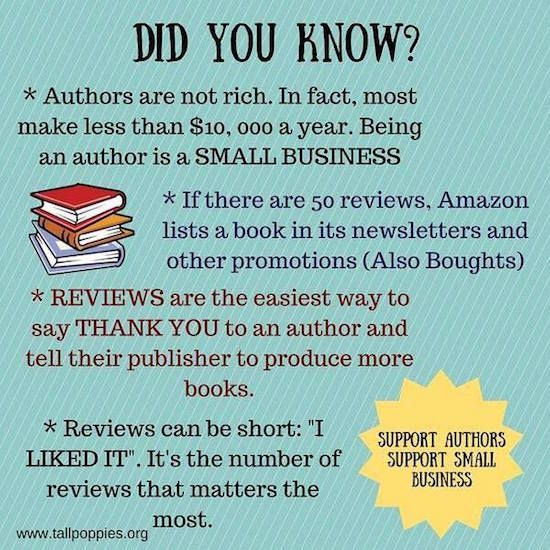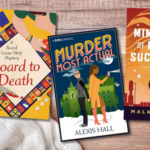
How To Support A Book or Favorite Author: 6 Easy Tips (Including Many Free Ones!)
I have a new book coming out in October. While I feel I have talked about it nonstop, I still find many people I know or who are familiar with ask me about it and are surprised to learn it’s happening so soon (the book is called Don’t Call Me Crazy: 33 Voices Start The Conversation about Mental Health and is an anthology that features essays and art about mental health). This is only made more complicated because, as someone who works in a world of books, I’m always working months ahead of time when it comes to reading. But what about when a book is coming out in a couple weeks or hit shelves in the last few days, weeks, or months? I’ve put together a handy little guide to how t0 support a book or favorite author.
This guide is meant as a way to spread the word about a book you love or you want to get more attention, and all of the tips are pretty easy and straightforward. Some will cost you a little bit of money while others are completely free and will cost little more than a few minutes of your time.
Whatever your investment, here are a few ways for how to support a book or favorite author.

Preorder The Book
You’ve likely seen authors talk about preordering their book. Preordering is simply placing an order for the book through your favorite retailer before the book is published. Some places guarantee that whatever the lowest price the book comes to between the time of order and publication date is the price you pay, so it doesn’t matter if you want to get it a little cheaper.
Why does preordering matter?
Books that are sold during the first week of a book’s publication show to a publisher there is interest in the title. Those preorders are counted toward first-week sales, so it can give a huge boost to a title when many orders are placed before the book’s publication date.
If there’s interest in a book and it’s shown clearly from the start, the chances of your favorite author getting another book deal increases. It’s also possible that with an increase in preorders through bookstores, more copies of that particular title or that author’s titles may be available in store. More in store placement of books means the chances of the book finding a new readership increase. As much as everyone wishes that every book were in bookstores—independent or chain—it’s simply not the case.
Poke around here to learn a little more about how and why preorders matter.
Cost: The price of the book.
Request The Book Be Purchased For Your Library
Many public libraries have forms either on their website or in person which allow you to recommend books for their collection. If you do a search of the library catalog and notice a new or upcoming title isn’t listed, drop a recommendation.
To make this process as seamless as possible, when you submit the request, make sure to include why. Note the author’s previous books, and include book reviews for the new title if you have them (places like Kirkus Reviews have their reviews online and often, they’re published weeks or months in advance of the book). You might also find it worthwhile to explain that you read the book and loved it and think readers who like a certain genre or similar author might, too.
There’s no guarantee the book will be purchased by the library, but it will show interest to the purchasers. This gets the book on their radars to look up. In my own experience working in libraries, so long as someone wasn’t abusing the system—requesting a ton of titles all the time, requesting their own books, etc.—I tended to purchase all books requested, since I knew they’d be borrowed by at least one person.
Cost: Nothing but a little of your time!
Borrow the book from your local library
One of the tools that librarians use when making purchasing decisions is the circulation records of previous titles. This is why every James Patterson book is on standing order; his books circulate very well, and thus are automatically purchased when a new book comes out.
If you love a book or an author and prefer to borrow, rather than buy, books, take the time to get it from the library. The library’s purchase and your borrowing do make a difference to an author or a book.
Although it’s not always guaranteed, if you are able to put a hold request on a book before it’s available, that might help libraries make a decision of whether or not to purchase more than a single copy. Books which are showing a lot of activity, like multiple holds on a single copy, suggest that the popularity and interest is there and the library should consider purchasing another copy or two to fulfill the interest.
You may think that not buying the book and instead relying on the library doesn’t help a book or author. But it does! Libraries make a huge difference for those books and authors.
Cost: Nothing but your time (and maybe overdue fines if you, like me, are terrible about due dates).
Attend An Author’s Event
Is your favorite author having an event that’s easy for you to get to? Take the time and go. It’s not always easy to do, but if the means are there, take advantage. A packed audience for an event is a sign to the bookstore that there’s interest in the author—as well as similar authors—and thus, they may have the opportunity to return with future books.
It’s not always necessary to buy the book when you attend an event, though it’s always nice to purchase something when you attend an event. Buy a cup of coffee in the cafe, a cool pair of socks from their sideline items, or even a book that you’ve been meaning to buy. This is not necessary, but it is a nice thank you to the store for hosting the event.
Of course, if you can buy the author’s book, do that. Consider gifting it to a friend or family member if you don’t need it because you’ve already preordered it or because you’ve borrowed it from the library.
Also? Authors love looking at an audience of people there to hear about their work. Your presence is welcome, and know that when you talk with them afterward or ask a question during the Q&A portion of the talk, they’re so thrilled to hear from you. You are why they have the opportunity to be there, and that doesn’t get forgotten.
Authors list their events on their websites, as well as across social media. But you can also keep an eye on local bookstores for their upcoming events and attend those that sound even remotely interesting to you—you may discover a new favorite by simply taking the chance. Plus, it’s fun to get out of the house for an hour or two in the middle of the week if you can.
Cost: Whatever you choose to purchase from the event.
Leave Reviews on Consumer Websites
 Have you seen the meme circulating about how, when a book reaches 50 reviews on Amazon, it’s included in more of their promotional materials? If not, take a peek over to the left.
Have you seen the meme circulating about how, when a book reaches 50 reviews on Amazon, it’s included in more of their promotional materials? If not, take a peek over to the left.
It’s hard to determine if that’s true or not, but I can say from my own book writing experience that once I hit 50 reviews, I definitely saw my book popping up in more of the “You might also like” features other similar books.
If you’ve loved a book, one of the most powerful things you can do is drop a review on consumer sites like Amazon, Barnes & Noble, Chapters, Target, Walmart, and more. These reviews are super helpful for browsers considering a purchase, and even something as simple and straightforward as “This book was excellent, and I would recommend it for people who like books that are (insert genres or styles) or television shows like (name show).” If you write one review, you can copy and paste it across a couple of different sites.
One of the tips I have from doing this is to spend 10 minutes once a month drafting a few reviews of recent reads and then dropping them all at once. This makes it part of a habit, and it’s one that doesn’t require much time.
If you’re feeling really motivated, you can drop reviews on places like Goodreads or your library’s catalog, too. Those help people find a book and consider whether to buy or borrow it.
Cost: A few minutes of your time.
Recommend the book on social media, your favorite blogs, and to friends in person looking for a good book
Do you use social media or keep a blog? Writing about the books or authors you love or sharing short reviews and images really does make a difference. It gets the book on radars of other readers, as well as those who might not generally call themselves readers but like you and are therefore intrigued.
One of the things that’s worth doing is seeing if there’s a hashtag related to the book. Many publishers and authors choose a hashtag for the book, and if it’s not on the book itself, do a quick search to see if there’s a hashtag with the book’s title or the author’s name. When you do something on social media with the book, include those tags. It’ll help your voice be amplified and allow those who find out about the book from you an opportunity to discover more about the book.
Never overlook the power of talking about the book to people you know, too. In the course of a day or week, it’s likely that if people know you’re a reader, you’ll get asked for a good book. Here’s your chance to highlight a recent favorite title or author and spread the word.
The same principles that make consumer reviews powerful are those which make your personal recommendation in your own personal spaces powerful. Maybe even more so, since your name and face mean something to the people who care about you, and your seal of approval for something means just that much more to them (Think about it: you might peruse reviews of a place to get your car fixed for hours, but if your best friend says she loves a certain shop, you are more likely to go to that shop than the one which had 100 five-star reviews).
If writing reviews on your blog or on social media isn’t your jam, think more creatively: share quotes from the book you’ve loved or simply take a picture and share it. Maybe you’d like to connect it to a favorite TV show or song and talk about how and why they remind you of one another. Be as creative as you’d like—every voice matters in getting the word out, and sometimes, it’s those creative, clever things that can have the most power. Perhaps you won’t convince someone to buy the book for themselves, but you might convince them that it’s a book someone they know would love, ultimately leading them to gift it to someone else. That is power.
Cost: Your time!
None of these are brilliant suggestions for how to support a book or favorite author, but they’re all tried-and-true strategies. They’re real, tangible ways you as a reader and book lover can do work that makes a powerful and lasting difference.
If you’d like even more ideas—including plenty of creative ones!—check out our previous post on 99 ways to get the word out about a book.










